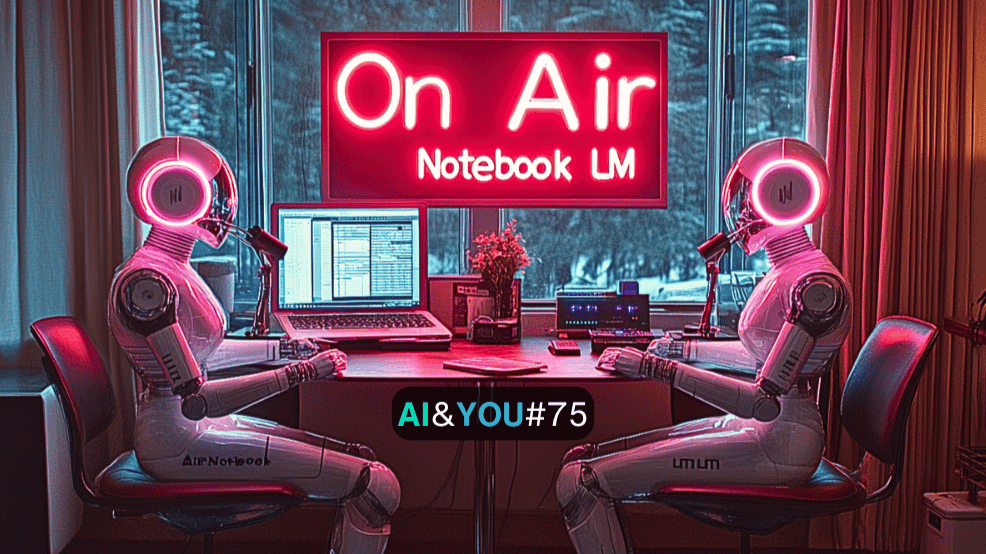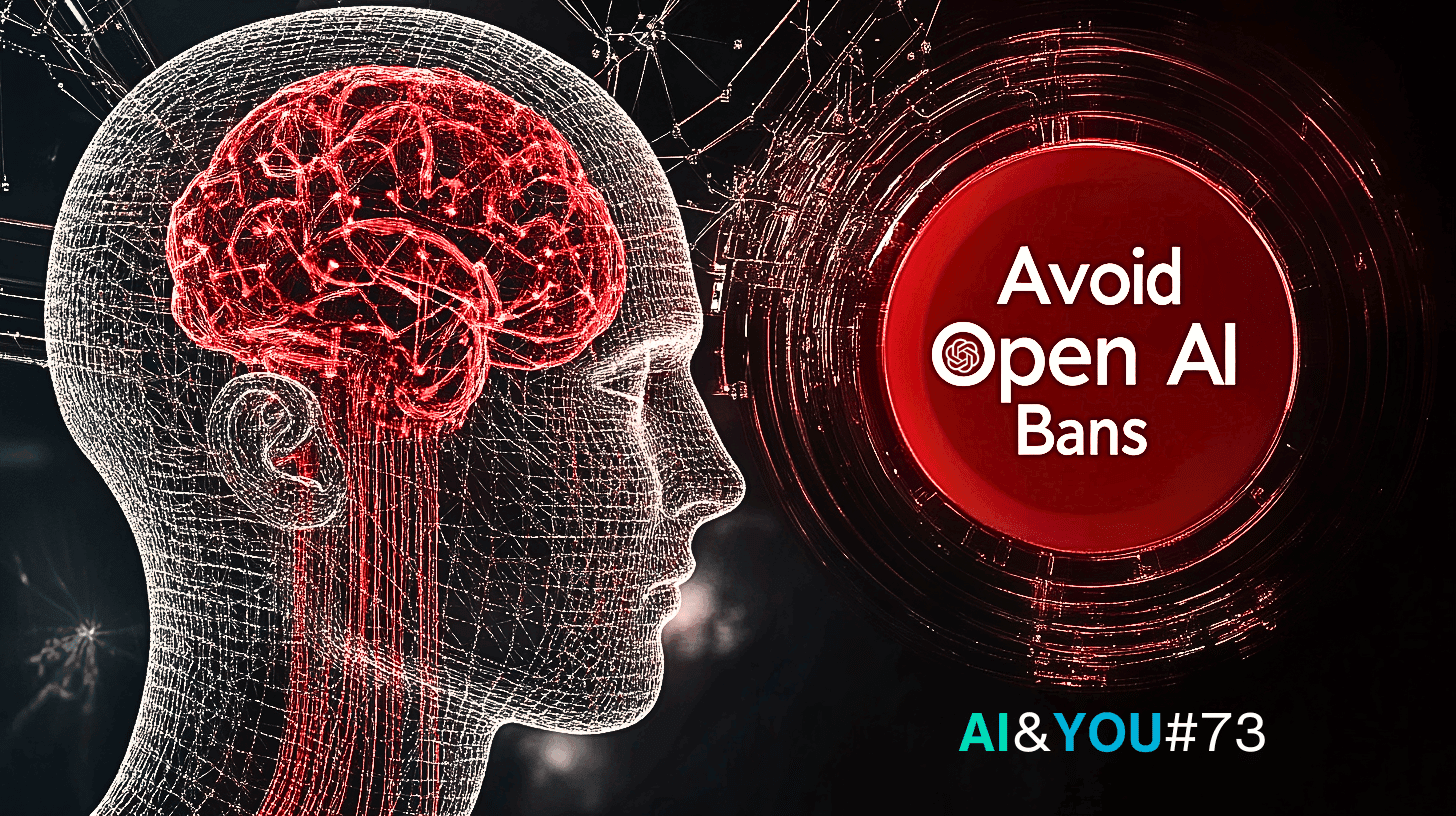AI&YOU#47: 5 Ways Endless, Customizable AI Content Changes Marketing + How to Spot Deepfakes
Stat of the Week: One-quarter of people fail to identify deepfake audio. (PLOS One)
In this week’s edition, we are exploring five ways this new access to endless, customizable AI content will change marketing and your digital strategy.
At Skim AI, we have firsthand experience with this, implementing AI throughout our content pipeline. With this approach, we have achieved exponential growth in our content numbers.
We will also delve into deepfakes, tell-tale signs for detecting them, and some eye-opening stats from recent research.
Our published articles this week include:
- AI&YOU #47: 5 ways endless, customizable AI content will change marketing and your digital strategy.
- 1. It will cause a huge increase in content competition online.
- 2. It will blur the lines between what is real and fake.
- 3. It will enable any small team or entrepreneur to create scalable content like a large enterprise.
- 4. It will lead to a lot more hyper-personalized content.
- 5. Google’s new policy on “unhelpful content” will ban many websites.
- Embrace AI with Strategy and Creativity
- How to Recognize an AI-Generated Image or Deepfake Video
- 4 Ways to Spot an AI-Generated Image
- 3 Detection Techniques for Deepfakes
- 5 Deepfake Stats You Need to Know for 2024
- Thank you for taking the time to read AI & YOU!
AI&YOU #47: 5 ways endless, customizable AI content will change marketing and your digital strategy.
The era of AI-driven content creation and marketing marks a monumental shift, creating an environment where every individual and small enterprise team has access to highly customizable, endless AI content.
AI tools such as generative AI bots, text-to-video, text-to-image, and speech-to-speech or synthetic voice are not only enhancing but also radically transforming how we approach content creation. This change is set to redefine the strategies of marketing teams and the operations of enterprises globally.
As we delve into these transformative effects, our focus is on understanding how this widespread access to AI tools impacts businesses, entrepreneurs, and marketers. This shift goes beyond enhancing the creative process – it’s about reimagining it. AI is now a critical component in creating diverse, engaging content quickly and efficiently, reshaping the standards for SEO-optimized blog posts, and redefining long-form content in the digital marketing arena.
1. It will cause a huge increase in content competition online.
AI tools have significantly lowered the barrier to creating scaled content, leading to an influx of AI-generated text, images, and videos. This surge in content creation intensifies competition for audience attention, necessitating a strategic approach for businesses to stand out.
Beyond just leveraging AI for efficiency in generating SEO-optimized and visually appealing content, the key to differentiation lies in combining AI’s capabilities with human creativity. This includes crafting content that resonates through storytelling, emotion, and relatable experiences.
Additionally, for global reach, businesses must blend AI’s proficiency in multilingual content generation with human insights to navigate cultural nuances and localize content effectively. This harmonization of AI efficiency and human creativity is crucial for businesses to maintain competitiveness and lead in the evolving landscape of digital content.

2. It will blur the lines between what is real and fake.
The rapid advancement of AI in creating text, images, videos, and deepfakes is increasingly blurring the distinction between reality and AI-generated content. Sophisticated AI models now facilitate a wide array of content, from AI-written blogs to visually engaging videos, challenging our ability to discern between human and AI creations.
In digital marketing and content creation, this raises concerns about the authenticity of content, a key factor in building digital trust. As AI tools can produce compelling articles and high-quality videos, it complicates the real vs. artificial debate, impacting consumer trust and the perceived value of human creativity.
For businesses and content creators, it’s crucial to balance AI’s efficiency and capabilities with the authenticity and ethical considerations of human input. AI-generated content is powerful, and the strategy lies in using AI to its full potential while ensuring content retains a human touch in storytelling and creativity, to maintain audience engagement and prevent the perception of content being entirely AI-generated with no human involvement.

3. It will enable any small team or entrepreneur to create scalable content like a large enterprise.
The emergence of AI tools in content creation has revolutionized the capabilities of small teams and entrepreneurs, allowing them to produce content on par with larger enterprises. AI-generated content, spanning text, videos, and images, democratizes the digital marketing and creative production fields, making high-quality content creation more accessible and less dependent on extensive resources.
For instance, a small online retail business can now use text-to-image AI tools to create striking graphics for social media, or leverage text-to-video technologies for promotional content, achieving rapid scalability in marketing with minimal effort. Solo entrepreneurs can also harness AI for SEO-optimized blog posts and multilingual content, enhancing their online presence and audience reach. Even small podcast producers can use synthetic voice technology to generate content in multiple languages, expanding their listener base globally without a multilingual team.
These developments highlight AI’s role in leveling the playing field, enabling small entities to produce diverse, high-quality content, and compete effectively in the digital marketplace.

4. It will lead to a lot more hyper-personalized content.
The integration of AI in content creation marks a significant shift towards hyper-personalized marketing and customer engagement. AI tools, capable of analyzing extensive data, now also enable the tailoring of content to individual preferences and behaviors, offering businesses a more targeted approach to reach their audience.
This personalization extends from AI-generated text in email campaigns to customized video content on social media, each tailored to resonate with specific audience segments. AI content writers can produce niche-focused blog posts and long-form content in multiple languages, ensuring both personalization and cultural relevance.
Additionally, AI’s predictive capabilities allow businesses to anticipate future consumer trends, enabling them to create content that remains relevant over time. This move towards hyper-personalized content is transforming digital marketing strategies, emphasizing the creation of content that connects with each individual, thereby enhancing customer engagement and fostering deeper brand loyalty.

5. Google’s new policy on “unhelpful content” will ban many websites.
As AI-driven content creation tools become more prevalent, businesses face a new challenge due to Google’s tougher stance against “unhelpful” content. The ease of generating high volumes of content with AI can risk producing generic or low-value material, potentially leading to severe consequences like downranking or complete removal from search results.
To counter this, it’s essential for companies to ensure AI-generated content is not only SEO-optimized but genuinely valuable, unique, and engaging. This includes adding unique insights, detailed analysis, and personalized elements beyond generic AI output.
Blending AI with human creativity can produce content that meets SEO standards and resonates with readers, enhancing engagement. This shift in Google’s policy highlights the importance of using AI in content creation thoughtfully, focusing on uniqueness, value, and relevance, to avoid search engine penalties and contribute positively to the online information landscape.

Embrace AI with Strategy and Creativity
As we’ve explored the transformative effects of AI on content creation, it’s clear that this technological evolution presents both immense opportunities and notable challenges. From intensifying competition and blurring the lines between real and AI-generated content, to empowering small teams and demanding higher standards of content quality, the landscape is rapidly changing. Businesses must not only embrace AI tools for their efficiency and versatility but also approach their use strategically, ensuring that the content they generate is unique, engaging, and valuable.
How to Recognize an AI-Generated Image or Deepfake Video
This week, we are also looking at how to recognize an AI-generated image or deepfake video. As this explosion of AI-generated content occurs, being able to detect it will become a valuable skill.
This discernment is vital not just for professionals in fields directly interacting with visual media, but for anyone navigating the vast sea of digital content. The reason transcends mere curiosity or technical interest; it touches on the very essence of media literacy and the ability to understand and critically analyze the content we consume.
For professionals in various industries, understanding AI imagery is also about staying ahead in a rapidly evolving landscape. It’s about knowing the possibilities and limitations of AI in image creation, which can be a powerful tool in areas like marketing, branding, and visual storytelling. For consumers and digital citizens, it’s about being able to navigate the digital realm with a discerning eye, differentiating fact from fiction, and reality from AI-created illusions.
4 Ways to Spot an AI-Generated Image
Origins and Digital Footprints: AI-generated images often lack detailed metadata like camera model, date, time, or location, which are typically found in genuine photographs. These inconsistencies in the digital footprint can indicate an AI creation.
Telltale Visual Signposts: Look for unnatural geometry, inaccurate lighting and shadows, or repetitive patterns in an image. These visual anomalies can reveal AI involvement.
Chromatic and Textural Signals: AI tends to overdo or understate colors, resulting in overly vivid or unnaturally muted images. Also, the texture in AI-generated images may lack the irregularity and variance of real-life textures, appearing too smooth or overly detailed.
The Uncanny Valley: Especially in images of human faces or figures, AI creations often fall into the uncanny valley, with slight yet unsettling abnormalities like distorted features or awkward expressions, which can be more noticeable than larger distortions.

3 Detection Techniques for Deepfakes
Facial and Expressive Incongruities: Look for inconsistencies in facial features or expressions. Deepfake faces may have anomalies like unnatural blinking, distorted features, or expressions not matching the emotional tone of speech, due to AI’s struggle with human expressions.
Motion and Synchronization Issues: Observe for mismatches between lip movements and speech or unnatural head and body movements. Deepfakes often lack the fluid motion of genuine human movements, appearing slightly stilted or artificial.
Auditory Discrepancies: Pay attention to the voice. If it doesn’t match the person’s typical speech patterns, tone, or cadence, or if there are discrepancies in background sounds or the voice sounds unnatural, it could indicate a deepfake.

5 Deepfake Stats You Need to Know for 2024
With the rise of generative AI and various tools and platforms that make it easy to create AI-generated media, it’s important to understand the implications such media is having.
Here are five stats you need to know about deepfakes and AI-generated images and videos:
1. Deepfake financial attempts increased 31-Fold in 2023, marking a 3000% growth year-on-year.
2. One-quarter of people fail to identify deepfake audio.
3. 71% of global respondents admitted to not knowing what a deepfake is.
4. Some user-friendly deepfake tools attract as many as 10 million monthly searches.
5. Global deepfake incidents surged 10x from 2022 to 2023 with notable regional differences
Thank you for taking the time to read AI & YOU!
For even more content on enterprise AI, including infographics, stats, how-to guides, articles, and videos, follow Skim AI on LinkedIn
Are you a Founder, CEO, Venture Capitalist, or Investor seeking AI Advisory or Due Diligence services? Get the guidance you need to make informed decisions about your company’s AI product strategy or investment opportunities.
We build custom AI solutions for Venture Capital and Private Equity backed companies in the following industries: Medical Technology, News/Content Aggregation, Film & Photo Production, Educational Technology, Legal Technology, Fintech & Cryptocurrency.






